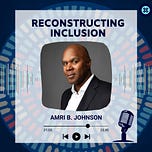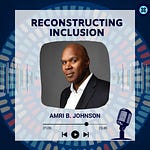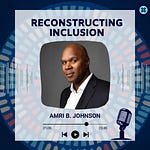Welcome to the Reconstructing Inclusion Podcast!
The letters D-E-I have become a battleground rather than a bridge. As polarization intensifies and executive orders sweep away years of work, many practitioners have retreated into the metaphorical cave of “Chicken Little”, convinced the sky is falling.
They couldn't be more wrong.
Throughout this tumultuous period, I've observed both proponents and opponents of inclusion work equally invested in distorting what genuine, transformative inclusion actually looks like. This episode peels back these layers of misunderstanding to reveal what remains possible even—perhaps especially—in challenging times.
Drawing from years of experience and the development of the Emergent Inclusion Framework, this conversation moves beyond ideological battles to explore how inclusion, when properly understood as a set of organizational capabilities, becomes nothing less than a superpower for adaptability, innovation, and sustainable growth in uncertain environments.
To whom is “Reconstructing Inclusion” for?
"I wrote Reconstructing Inclusion for a broad audience, for people that worked in organizations that really had influence on the organizational culture. My focus for the conversation was not just on DEI practitioners. It was for everyone else that might not have the vocabulary, the jargon, et cetera, in the space. But I wanted them to understand how everybody is a part of this conversation." [00:02:00]
My approach cuts to the heart of why many DEI initiatives ultimately falter—they remain trapped in specialized departments rather than flowing throughout an organization's culture. Creating my book for a broader audience beyond practitioners reflects my deep conviction that cultural transformation demands widespread understanding and participation from everyone, not just DEI specialists.
"So my focus was on making the conversation about DEI being accessible, actionable, and aligned. What I mean by that is when it's accessible, it means to everyone. Everyone is a part of the paradigm of inclusion as I see it and as I believe it can be and has to be for its transformational potential to be realized." [00:03:00]
Inclusion must connect directly to organizational purpose. The most common failure point in DEI work: initiatives that float disconnected from core business objectives quickly become unsustainable and are the first cut when challenges arise.
Systems Over Symptoms: A Different Approach
"Reconstructing Inclusion did not focus on symptoms. I focused on systems. That means people that are focused on DEI as core of their role, they cannot change a system or shift those systems on their own. They can't engage with the patterns of a complex adaptive system, which organizations are, without really broad engagement." [00:04:52]
Through systems-thinking, I offer a fundamental departure from conventional DEI initiatives that merely address surface-level manifestations rather than transform underlying structures. Viewing organizations as complex adaptive systems allows me to recognize that lasting change requires broad engagement across all organizational layers.
Moving beyond the typical emphasis on representation alone, I focus instead on how genuine inclusion creates fertile conditions for both individual and organizational flourishing. By introducing concepts like "generative" and "anti-fragile" organizations, I deliberately connect inclusion work to what executives truly value—organizational resilience and sustained innovation capacity.
"When I talk about anti-fragile, it's from the work of Nassim Taleb. And it's really about bouncing back from stressors and not just bouncing back to the baseline, but bouncing back stronger, that you don't break. You might bend, but when you bend, you come back with the kind of force that propels you to the next level." [00:05:56]
Establishing this vital connection between inclusion and organizational resilience creates a compelling business case that transcends typical compliance or social responsibility arguments. Framing inclusion as a critical capability for navigating uncertainty and change allows me to counter the common misconception that DEI initiatives operate peripheral to business success. Instead, they become central to an organization's ability to innovate and adapt in turbulent environments.
The ‘Hijacking’ of DEI
"The letters DEI got hijacked in the past few years by newer practitioners, pro-DEI, as well as opponents, anti-DEI. They've both, in a way, hijacked it and, in both cases, the hijacking has been incomplete. Like hijacking often is." [00:07:31]
Uncovering a fascinating paradox in today's DEI landscape reveals how both proponents and opponents have benefited from promoting simplified, often distorted versions of what genuine inclusion work entails. Their mutual "hijacking" has created a polarized discourse where nuance disappears and deeper principles become obscured, leaving the true transformative potential of inclusion work hidden beneath ideological battles.
"If one is known as 'anti-DEI,' an anti-DEI activist, what happens if DEI goes away? The reality is that anyone opposing the three letters believes in an ideology that ironically depends on: what they claim to oppose." [00:08:28]
Looking deeper, we can see why DEI debates have become so politically charged—a symbiotic relationship exists between promoters and opponents, with both camps often relying more on ideology than substantive principles. My challenge to both sides involves moving beyond simple positioning for or against DEI as a concept and instead articulating the foundational principles that should guide this critical work in organizations.
"Principles will always shine a blinding light on ideology, and one with an ideological fixation will do all they can to smother, discredit, or dismiss any elevation of principles, and they'll do so with the power of their reach and the ideological audience they've captured." [00:09:40]
My call for principle-centered approaches charts a middle path that sidesteps the twin pitfalls of uncritical acceptance and wholesale rejection of DEI work. Emphasizing principles over ideology lays a foundation for inclusion work that can withstand political shifts and organizational changes, creating sustainability where ideologically-driven approaches inevitably falter when conditions change.
Lessons from ‘Chicken Little’
"If you're familiar with the story of Chicken Little... they didn't have much dialogue. Foxy Loxy played his tricks and the chickens panicked. Chicken Little, their leader, told him the sky was falling and then they followed Chicken Little into a cave and they never ate another kernel of corn." [00:13:42]
How many DEI practitioners have unfortunately responded to criticism with panic rather than principle—a reaction that ultimately led to their own professional demise? The ‘Chicken Little’ metaphor perfectly captures the reactionary stance that has severely weakened DEI's position and credibility within many organizations when practitioners overreacted rather than thoughtfully addressing legitimate concerns.
"No one could have anticipated the overwhelming speed of the Trump administration and their followers. We could have known it was coming and I did and began to start preparing for it. But the speed was overwhelming and it's difficult right now." [00:15:26]
Even while acknowledging the significant external pressures, I firmly believe practitioners must take responsibility for how they've approached their work. My critique extends particularly to once-prominent voices who have now gone silent precisely when their leadership is most needed—disappearing as the political tide turned against DEI initiatives rather than adapting their approaches to meet new challenges.
"Now several anti-racist activists in the US and UK have stopped writing and contributing to the conversation completely, and they're doing so in a time when leadership is needed more than ever. Why is this the case? Well, in my opinion, from the outset. They lacked ample skin in the game." [00:16:44]
Calling for authentic commitment rather than opportunistic engagement represents a necessary challenge within the DEI space right now. Throughout my career, I've observed a clear distinction between those who entered the field during times of "bounty" and opportunity versus those demonstrating deeper, principle-centered commitment that withstands changing political and organizational winds.
The Importance of ‘Skin in the Game’
"Metaphorically, when the kitchen gets hot... the chefs stay. Those who are hobbyist cooks are more likely to move to a place they can be more comfortable and hope the heat dissipates or that the chefs prepare enough for everyone." [00:17:57]
Using a culinary metaphor, we distinguish between practitioners with genuine "skin in the game" and those who merely entered the field when conditions seemed favorable. My challenge to fair-weather inclusion advocates remains clear: maintain your commitment especially when political headwinds make the work more difficult, because that's precisely when organizations need this expertise most.
"In the DEI space, those recipes were based on grievance, race, racialization, gender, and particularly trans activism. What all of them had in common? Was they were steeped in deficit oriented 'what about-ism'." [00:19:39]
My critical assessment of deficit-oriented approaches signals an important evolution needed in inclusion work—a shift from focusing primarily on what's wrong toward creating conditions where everyone can genuinely thrive. Years of experience have shown me how the field's overreliance on grievance-based approaches has directly contributed to its current vulnerability, making it an easy target for those seeking to dismantle these initiatives.
"That there are many people that are still working hard to make inclusion an organizational superpower, like I am with my Emergent Inclusion Framework." [00:20:45]
Innovative approaches such as generative frameworks, appreciative inquiry, organizational network analysis, and the science of listening demonstrate that a vibrant community of professionals still remains committed to this work's transformative potential despite current challenges.
Key Takeaways
True inclusion work must be accessible to everyone in an organization, actionable through unambiguous prioritization, and aligned with organizational purpose to be sustainable.
Organizations are complex adaptive systems that require broad engagement to create cultural change—DEI practitioners alone cannot transform these systems without engaging influential people throughout the organization.
Both proponents and opponents of DEI have "hijacked" the conversation, often relying on ideology rather than principles, which has contributed to the field's current vulnerabilities.
Principle-centered approaches provide a more sustainable foundation for inclusion work than reactionary or ideologically driven methods, especially during times of political pressure.
The most effective inclusion practitioners maintain their commitment during challenging times, continually evolving their approaches rather than abandoning the field when it becomes difficult.
Moving from deficit-oriented "what about-ism" to approaches that create conditions for thriving represents an important evolution in how we frame inclusion work.
Resources:
Join our free EMERGENT Inclusion Framework virtual event. This isn't another discussion about group identities, allyship, and injustice. While those things have their place, the focus on symptoms rather than diving into the complexity of systems have not unlocked organizational value as practitioners and supporters have hoped for them to. Whether you're a skeptic or champion, your voice matters in this conversation.












